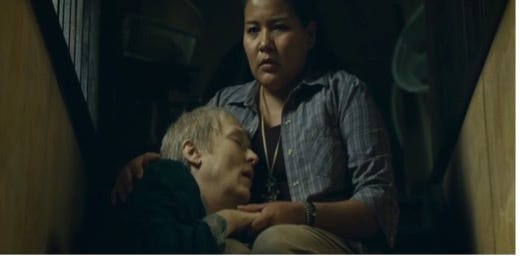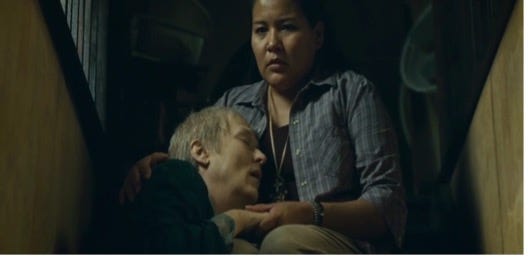Note from Backstage: Thanks in advance for taking the time to read this post. Please Like and share it to promote Backstage. The Backstage subscribers automatically receive new posts from Substack. Writers do not email their posts directly to subscribers.
__________________________________________________________________________
- “And then you’re gone and then you’re gone…”
- “This is the way the world ends.”
August: Osage County, last scene
Tracy Letts’s prize-winning play August: Osage County is a multi-layered family drama with a shocking conflict, provocative climax, and one-of-a-kind denouement that aptly resonates with the vibes in Scorsese’s Killers of the Flower Moon.
A (white) family comes together in Osage County after Beverly, the father, has gone missing and found drowned later. Before leaving home to end his life, Beverly hires Johnna, a Cheyenne woman as a live-in housekeeper to take care of his addicted, cancer-stricken wife Violate. Beverly gives a volume of T.S. Eliot’s poems to Johnna and tells her to read it for her own enjoyment.
The family members soon arrive upon hearing about their missing father: the eldest daughter Barbara with her husband Bill and their teenage daughter Jean, the second daughter Ivy, and the youngest daughter Karen with her fiancé Steve. Violate’s younger sister Mattie Fae also joins them with her husband Charlie Fae and their 37-year-old son Little Charles.
There is more to the case of the missing father than meets the eye. Before the Sheriff informs the family about Beverly’s drowning, Violate, under the influence, tells Barbara that she has already emptied their safe deposit box at the bank as per an agreement with Beverly. She had emptied the box before the family learned about Beverley’s death. While Violate’s mental state and uncontrolled behavior puts her under spotlight, the conflicts between the other members of the family get intense, and more about the relationships is revealed. Barbara and Bill have a turbulent married life because of Bill’s affair with his student. Little Charles who loves his so-called cousin Ivy, is Ivy’s half-brother- Mattie and Beverly’s illegitimate son. Steve, Karen’s fiancé, is sexually attracted to Jean- Barbara and Bill’s fourteen-year-old daughter.
In the middle of such crisis, the only one who is always there for the family when she is most wanted is Johnna, the Cheyenne housekeeper who is mostly silent throughout the play. As a case in point, she hits Steve with a skillet when she sees him coming on to the teenage Jean.
Johnna is the target of Violate’s constant verbal abuse. Violate calls her Indian and doesn’t care about political correctness when Barbara asks her to say Native American. Notwithstanding Violate’s harsh language, Johnna is the only one who stays with her after she is left alone. The last scene speaks louder than words: Violate, calling for Johnna, crawls up the stairs to the attic. She goes to Johnna’s room and crawls into her bosom. The Native American housekeeper cuddles the abandoned white mother who mumbles, “And then you’re gone and then you’re gone….” The play ends with Johnna’s quote from Eliot, “This is the way the world ends.”
The depiction of human traits such as greed, abuse and forgiveness on the one hand and the dichotomy of white Americans and Indian Americans in Letts’s play strikes me as relevant to the true story of the Killers of the Flower Moon. Following his uncle’s instructions, Ernest purposely marries Mollie to inherit her right to oil money. Mollie who suffers from diabetes eventually figures out that, despite the strong bond between the two, Ernest intended to poison and kill her. And worst of all, he was involved in the brutal murder of Mollie’s relatives for the same cause: owning the tribe’s right to the oil money. Mollie’s hopeless trust ends up in the bitter truth. She leaves Ernest when he refuses to confess that he intended to kill her.
Killers of the Flower Moon ends with the Native Americans’ powwow dance while in August: Osage County we see the desperately ill and abusive Violate take refuge in the bosoms of the Cheyenne housekeeper, the last and only one who stays by her side.
Both stories seem to pay homage to a nation that has been subject to the white Americans’ abuse of power for ages.
That the 2024 Academy Award was too short to reach the depth of the Killers of the Flower Moon may testify to the Americans’ avoidance strategy.
“We are the hollow men
We are the stuffed men
Leaning together
Headpiece filled with straw. Alas!”
The Hollow Men, T.S. Eliot





